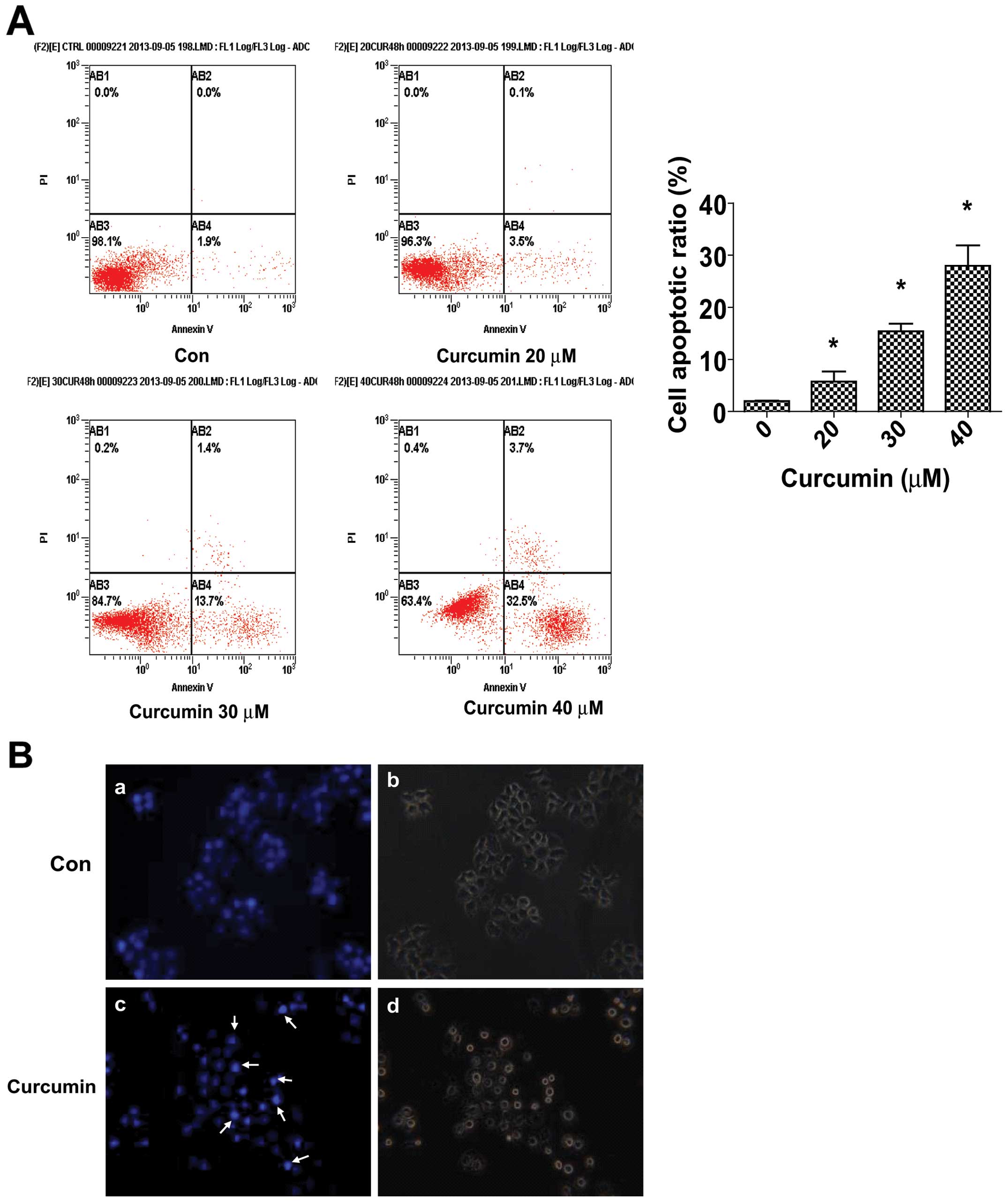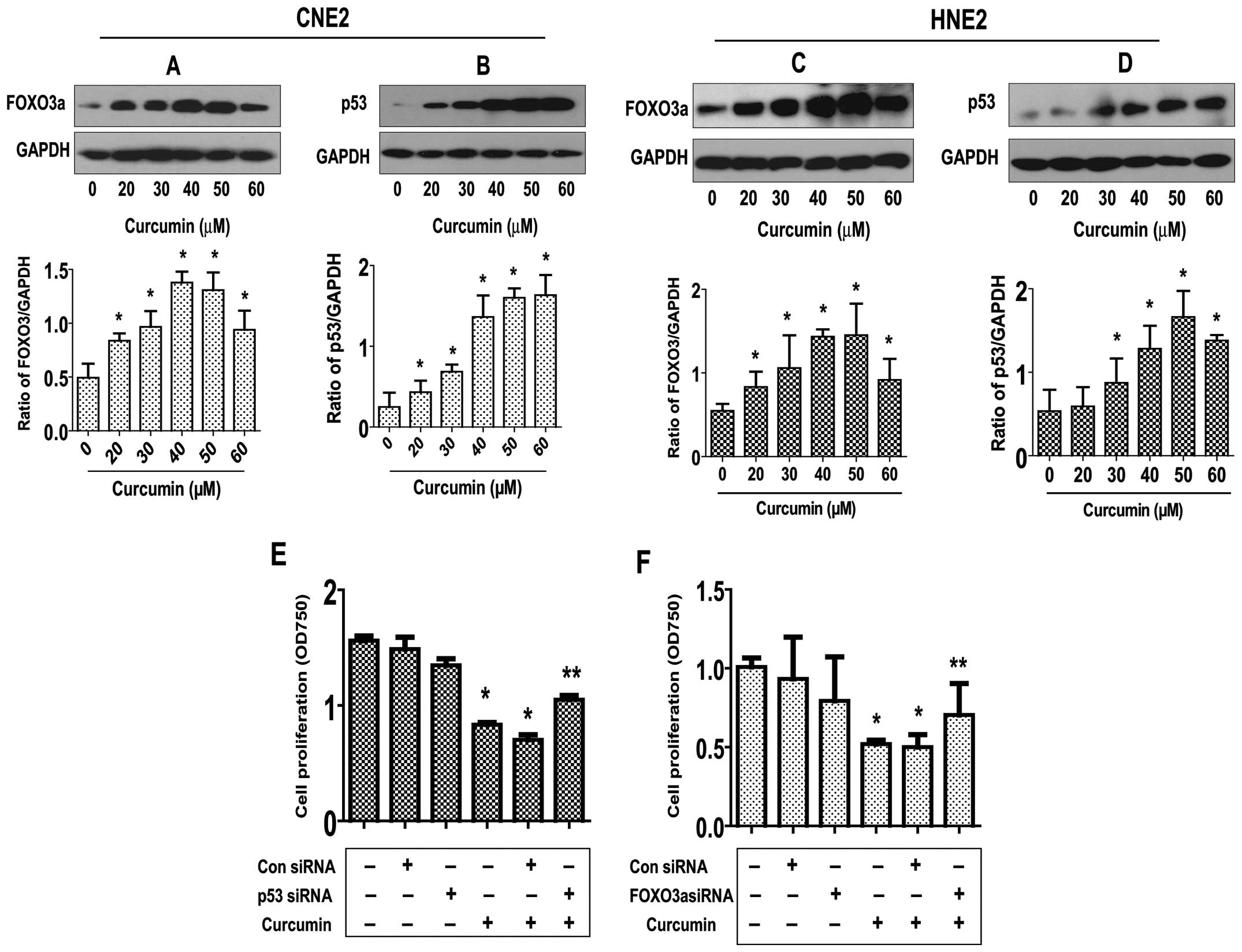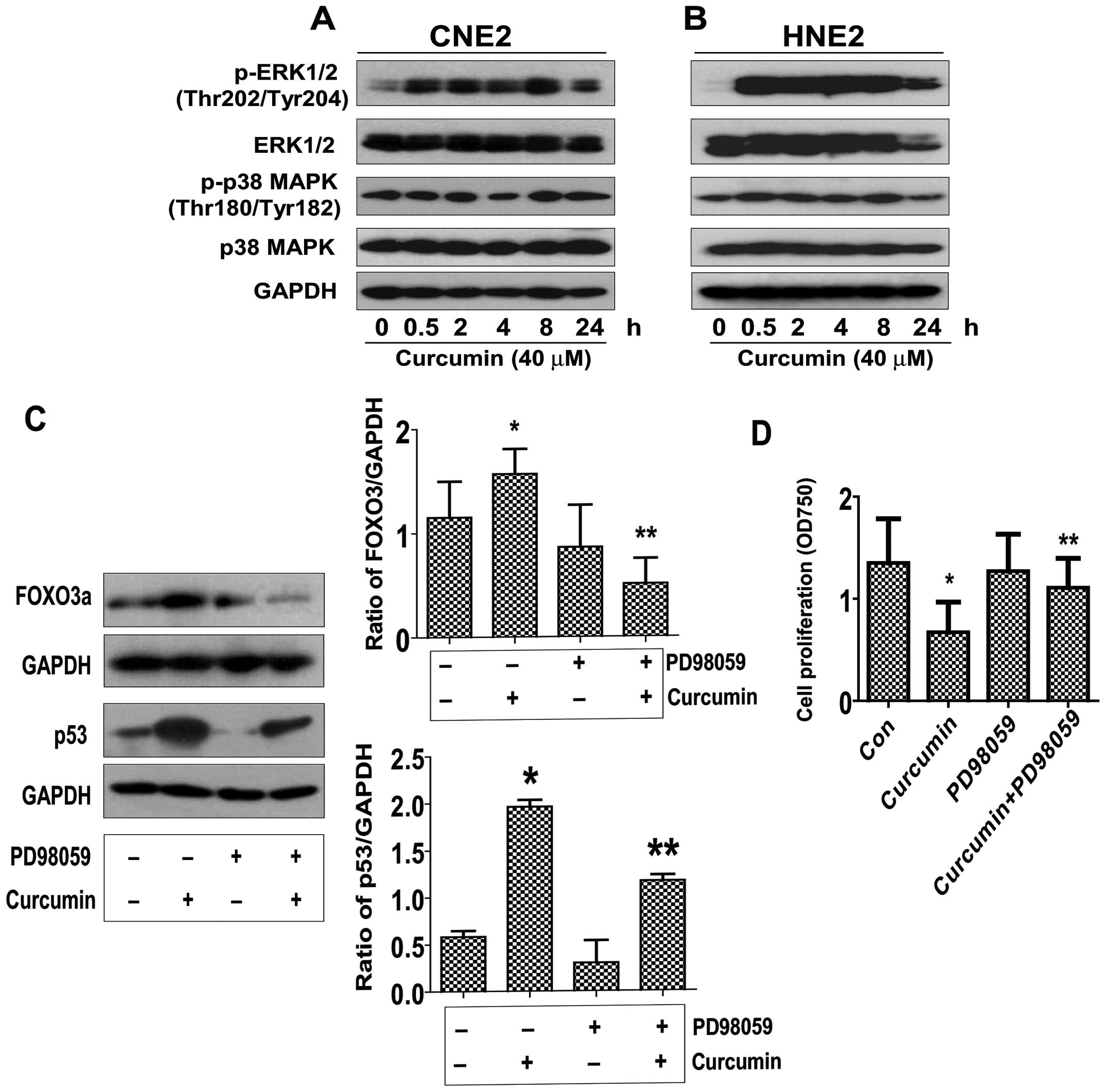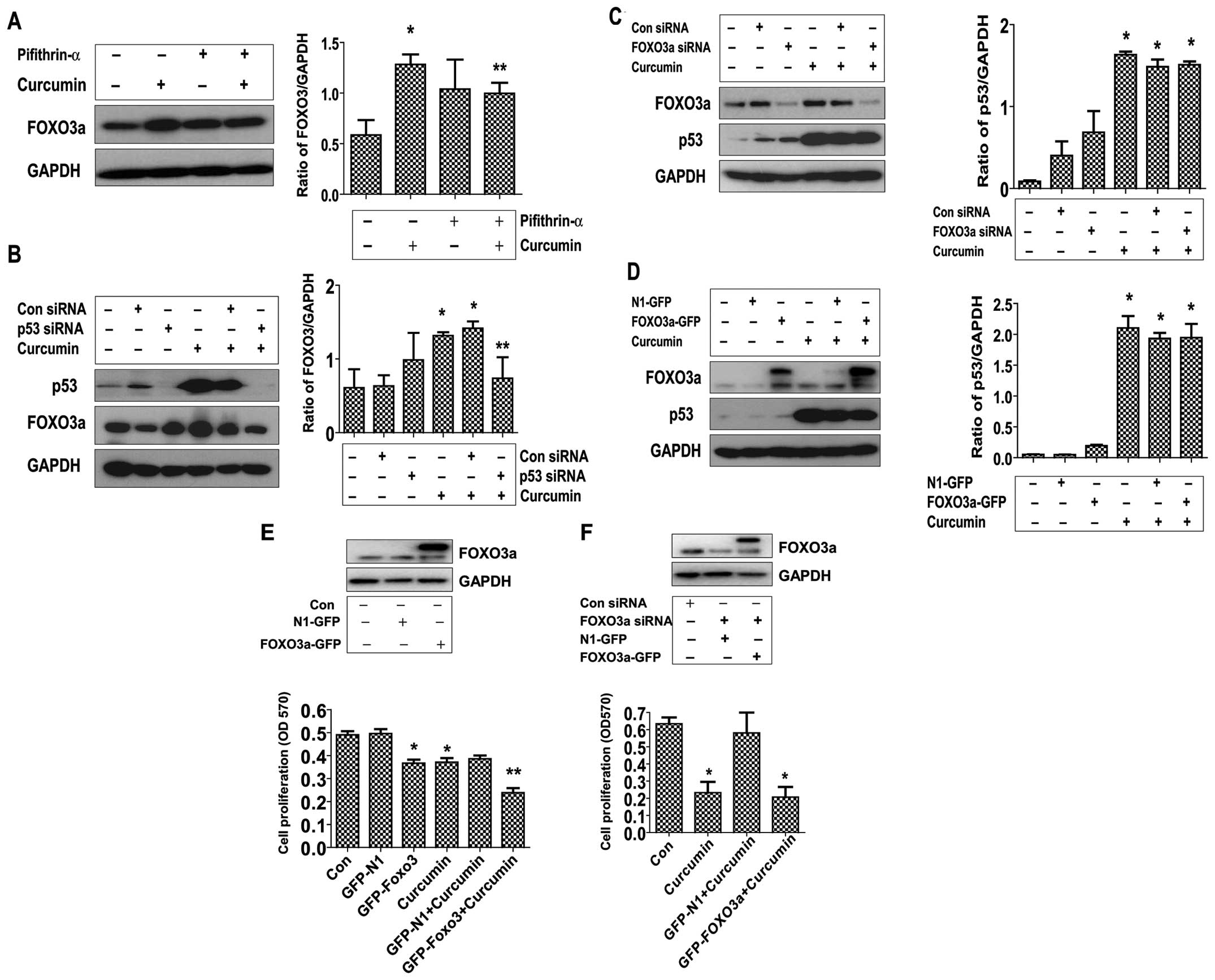|
1.
|
Xu Y, Zhang J, Shi W and Liu Y: Anticancer
effects of 3,3′-diindolylmethane are associated with G1 arrest and
mitochondria-dependent apoptosis in human nasopharyngeal carcinoma
cells. Oncol Lett. 5:655–662. 2013.
|
|
2.
|
Pan Y, Zhou F, Zhang R and Claret FX:
Stat3 inhibitor Stattic exhibits potent antitumor activity and
induces chemo- and radio-sensitivity in nasopharyngeal carcinoma.
PloS One. 8:e545652013. View Article : Google Scholar : PubMed/NCBI
|
|
3.
|
Aggarwal BB, Sundaram C, Malani N and
Ichikawa H: Curcumin: the Indian solid gold. Adv Exp Med Biol.
595:1–75. 2007. View Article : Google Scholar : PubMed/NCBI
|
|
4.
|
Wilken R, Veena MS, Wang MB and Srivatsan
ES: Curcumin: A review of anti-cancer properties and therapeutic
activity in head and neck squamous cell carcinoma. Mol Cancer.
10:122011. View Article : Google Scholar : PubMed/NCBI
|
|
5.
|
Nayak G and Cooper GM: p53 is a major
component of the transcriptional and apoptotic program regulated by
PI 3-kinase/Akt/GSK3 signaling. Cell Death Dis. 3:e4002012.
View Article : Google Scholar : PubMed/NCBI
|
|
6.
|
Hollstein M, Sidransky D, Vogelstein B and
Harris CC: p53 mutations in human cancers. Science. 253:49–53.
1991. View Article : Google Scholar
|
|
7.
|
Zeng GQ, Yi H, Li XH, et al:
Identification of the proteins related to p53-mediated
radioresponse in nasopharyngeal carcinoma by proteomic analysis. J
Proteomics. 74:2723–2733. 2011. View Article : Google Scholar
|
|
8.
|
Shen YA, Lin CH, Chi WH, et al:
Resveratrol impedes the stemness, epithelial-mesenchymal
transition, and metabolic reprogramming of cancer stem cells in
nasopharyngeal carcinoma through p53 activation. Evid Based
Complement Alternat Med. 2013:5903932013.
|
|
9.
|
Brunet A, Bonni A, Zigmond MJ, et al: Akt
promotes cell survival by phosphorylating and inhibiting a Forkhead
transcription factor. Cell. 96:857–868. 1999. View Article : Google Scholar : PubMed/NCBI
|
|
10.
|
Schmidt M, Fernandez de Mattos S, van der
Horst A, et al: Cell cycle inhibition by FoxO forkhead
transcription factors involves downregulation of cyclin D. Mol Cell
Biol. 22:7842–7852. 2002. View Article : Google Scholar : PubMed/NCBI
|
|
11.
|
Obsil T and Obsilova V: Structural basis
for DNA recognition by FOXO proteins. Biochim Biophys Acta.
1813.1946–1953. 2011.PubMed/NCBI
|
|
12.
|
Yang JY, Zong CS, Xia W, et al: ERK
promotes tumorigenesis by inhibiting FOXO3a via MDM2-mediated
degradation. Nat Cell Biol. 10:138–148. 2008. View Article : Google Scholar : PubMed/NCBI
|
|
13.
|
Shou Z, Lin L, Liang J, Li JL and Chen HY:
Expression and prognosis of FOXO3a and HIF-1alpha in nasopharyngeal
carcinoma. J Cancer Res Clin Oncol. 138:585–593. 2012. View Article : Google Scholar : PubMed/NCBI
|
|
14.
|
Wen Q, Duan X, Liao R, et al:
Characterization of intracellular translocation of Forkhead
transcription factor O (FoxO) members induced by NGF in PC12 cells.
Neurosci Lett. 498:31–36. 2011. View Article : Google Scholar : PubMed/NCBI
|
|
15.
|
Wang F, Marshall CB, Yamamoto K, et al:
Biochemical and structural characterization of an intramolecular
interaction in FOXO3a and its binding with p53. J Mol Biol.
384:590–603. 2008. View Article : Google Scholar : PubMed/NCBI
|
|
16.
|
Ye F, Zhang GH, Guan BX and Xu XC:
Suppression of esophageal cancer cell growth using curcumin,
(−)-epigallocatechin-3-gallate and lovastatin. World J
Gastroenterol. 18:126–135. 2012.
|
|
17.
|
Subramaniam D, Ponnurangam S, Ramamoorthy
P, et al: Curcumin induces cell death in esophageal cancer cells
through modulating Notch signaling. PloS One. 7:e305902012.
View Article : Google Scholar : PubMed/NCBI
|
|
18.
|
Quitschke WW: Curcuminoid binding to
embryonal carcinoma cells: reductive metabolism, induction of
apoptosis, senescence, and inhibition of cell proliferation. PloS
One. 7:e395682012. View Article : Google Scholar : PubMed/NCBI
|
|
19.
|
Sahu RP, Batra S and Srivastava SK:
Activation of ATM/Chk1 by curcumin causes cell cycle arrest and
apoptosis in human pancreatic cancer cells. Br J Cancer.
100:1425–1433. 2009. View Article : Google Scholar : PubMed/NCBI
|
|
20.
|
Bao B, Ali S, Banerjee S, et al: Curcumin
analogue CDF inhibits pancreatic tumor growth by switching on
suppressor microRNAs and attenuating EZH2 expression. Cancer Res.
72:335–345. 2012. View Article : Google Scholar : PubMed/NCBI
|
|
21.
|
Chen CC, Sureshbabul M, Chen HW, et al:
Curcumin suppresses metastasis via Sp-1, FAK inhibition, and
E-cadherin upregulation in colorectal cancer. Evid Based Complement
Alternat Med. 2013:5416952013.PubMed/NCBI
|
|
22.
|
Wang D, Hu J, Lv L, Xia X, Liu J and Li X:
Enhanced inhibitory effect of curcumin via reactive oxygen species
generation in human nasopharyngeal carcinoma cells following
purple-light irradiation. Oncol Lett. 6:81–85. 2013.
|
|
23.
|
Sundram V, Chauhan SC, Ebeling M and Jaggi
M: Curcumin attenuates beta-catenin signaling in prostate cancer
cells through activation of protein kinase D1. PloS One.
7:e353682012. View Article : Google Scholar : PubMed/NCBI
|
|
24.
|
Jiang M, Huang O, Zhang X, et al: Curcumin
induces cell death and restores tamoxifen sensitivity in the
antiestrogen-resistant breast cancer cell lines MCF-7/LCC2 and
MCF-7/LCC9. Molecules. 18:701–720. 2013. View Article : Google Scholar
|
|
25.
|
Blakemore LM, Boes C, Cordell R and Manson
MM: Curcumin-induced mitotic arrest is characterized by spindle
abnormalities, defects in chromosomal congression and DNA damage.
Carcinogenesis. 34:351–360. 2013. View Article : Google Scholar : PubMed/NCBI
|
|
26.
|
You H and Mak TW: Crosstalk between p53
and FOXO transcription factors. Cell Cycle. 4:37–38. 2005.
View Article : Google Scholar : PubMed/NCBI
|
|
27.
|
Qiao Q, Jiang Y and Li G: Curcumin
enhances the response of non-Hodgkin’s lymphoma cells to ionizing
radiation through further induction of cell cycle arrest at the
G2/M phase and inhibition of mTOR phosphorylation. Oncol Rep.
29:380–386. 2013.PubMed/NCBI
|
|
28.
|
Singh AT, Ghosh M, Forte TM, Ryan RO and
Gordon LI: Curcumin nanodisk-induced apoptosis in mantle cell
lymphoma. Leuk Lymphoma. 52:1537–1543. 2011. View Article : Google Scholar : PubMed/NCBI
|
|
29.
|
Sebolt-Leopold JS, Herrera R and Ohren JF:
The mitogen-activated protein kinase pathway for molecular-targeted
cancer treatment. Recent Results Cancer Res. 172:155–167. 2007.
View Article : Google Scholar : PubMed/NCBI
|
|
30.
|
Li R, Wang Y, Liu Y, et al: Curcumin
inhibits transforming growth factor-beta1-induced EMT via PPARgamma
pathway, not Smad pathway in renal tubular epithelial cells. PloS
One. 8:e588482013. View Article : Google Scholar : PubMed/NCBI
|
|
31.
|
Kang D, Park W, Lee S, Kim JH and Song JJ:
Crosstalk from survival to necrotic death coexists in DU-145 cells
by curcumin treatment. Cell Signal. 25:1288–1300. 2013. View Article : Google Scholar : PubMed/NCBI
|
|
32.
|
Wang WZ, Li L, Liu MY, et al: Curcumin
induces FasL-related apoptosis through p38 activation in human
hepatocellular carcinoma Huh7 cells. Life Sci. 292:352–358. 2013.
View Article : Google Scholar : PubMed/NCBI
|
|
33.
|
Renault VM, Thekkat PU, Hoang KL, et al:
The pro-longevity gene FoxO3 is a direct target of the p53 tumor
suppressor. Oncogene. 30:3207–3221. 2011. View Article : Google Scholar : PubMed/NCBI
|
|
34.
|
Miyaguchi Y, Tsuchiya K and Sakamoto K:
P53 negatively regulates the transcriptional activity of FOXO3a
under oxidative stress. Cell Biol Int. 33:853–860. 2009. View Article : Google Scholar : PubMed/NCBI
|
|
35.
|
Guo LD, Chen XJ, Hu YH, Yu ZJ, Wang D and
Liu JZ: Curcumin inhibits proliferation and induces apoptosis of
human colorectal cancer cells by activating the mitochondria
apoptotic pathway. Phytother Res. 27:422–430. 2013. View Article : Google Scholar : PubMed/NCBI
|
|
36.
|
Zingg JM, Hasan ST, Cowan D, Ricciarelli
R, Azzi A and Meydani M: Regulatory effects of curcumin on lipid
accumulation in monocytes/macrophages. J Cell Biochem. 113:833–840.
2012. View Article : Google Scholar
|
|
37.
|
Tudzarova S, Trotter MW, Wollenschlaeger
A, et al: Molecular architecture of the DNA replication origin
activation checkpoint. EMBO J. 29:3381–3394. 2010. View Article : Google Scholar : PubMed/NCBI
|
|
38.
|
Amente S, Zhang J, Lavadera ML, Lania L,
Avvedimento EV and Majello B: Myc and PI3K/AKT signaling
cooperatively repress FOXO3a-dependent PUMA and GADD45a gene
expression. Nucleic Acids Res. 39:9498–9507. 2011. View Article : Google Scholar
|



















